Paying the Bills of Dumpster Living
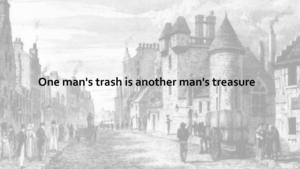 Some of us either work for a company or we own one and employ others to work for us. Others simply work for themselves, surviving off a craft, service or talent. But there are those who do very humbling jobs, the kinds that put our safety at risk, like cleaning the streets and draining or collecting the garbage. And then there are the very few who pay their bills off rummaging through the garbage looking for recyclables they can sell to earn a living. We call them scavengers, but whatever we refer to them as, we spoke to a few of them today who say they rather do that than to engage in a life of crime in order to live. News Five brings you this week’s edition of Belize on Reel on dumpster living.
Some of us either work for a company or we own one and employ others to work for us. Others simply work for themselves, surviving off a craft, service or talent. But there are those who do very humbling jobs, the kinds that put our safety at risk, like cleaning the streets and draining or collecting the garbage. And then there are the very few who pay their bills off rummaging through the garbage looking for recyclables they can sell to earn a living. We call them scavengers, but whatever we refer to them as, we spoke to a few of them today who say they rather do that than to engage in a life of crime in order to live. News Five brings you this week’s edition of Belize on Reel on dumpster living.
Marion Ali, Reporting
It was Scotsman Hector Urkuhart who wrote the popular English proverb: One man’s trash is another man’s treasure. This saying holds true for the people who rely on the bags of garbage we dispose of to earn an honest living to buy their meals and pay their bills.
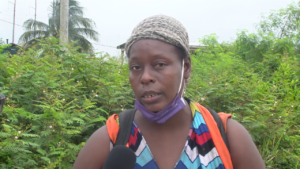
Patricia Robateau
Patricia Robateau, Trash Scavenger
“We gather aluminum, copper, bronze, plastic, Bowen & Bowen pints, tin.”
Marion Ali
“All these things are sold where, the metals?”
Patricia Robateau
“Well, we have buyers and we have our recycling shop.”
Earl Trapp is the mayor of San Ignacio and Santa Elena. He says that people oftentimes throw away items that only need minor repair, and the discards come as great finds for the scavengers.
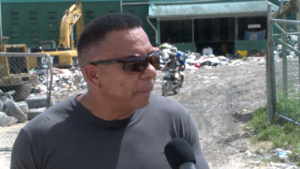
Earl Trapp
Earl Trapp, Mayor, San Ignacio/Santa Elena
“You could see people walking out with many fans many times. Sometimes it’s just one basic capacitor or one wire is broken, and it works. People have really been using this place as something to make a living from. People have used this place to send children to school, high school, sixth form, so, I know of some families that have picked up bottles on the roadside and sent their children to school with that.”
Patricia Robateau is a garbage scavenger who visits the Belize Waste Control transfer station at mile two on the George Price Highway in Belize City. She says that she lives off the trash that we throw away. Sometimes the job comes easy, she says, depending on what we pack them in.
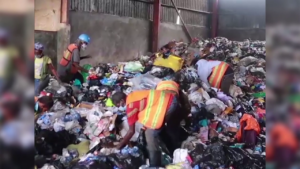 Patricia Robateau
Patricia Robateau
“Some of the bags are transparent and we can see through the bags and automatically we just grab the bag that we see the certain stuff that we want because the black bag, we have to open it and check it.”
For Robateau and her colleagues, Robert McKoy and Sidney Forbes, helping to control the garbage situation by recycling material that is thrown away is one part of what they do. There is the noble aspect of rummaging through our waste to earn a living.
Patricia Robateau
“It’s an honest way of making a living and it’s not very hard and you can take time off and go do extra stuff on the side. When you have a permanent job, you don’t even have time for yourself.”
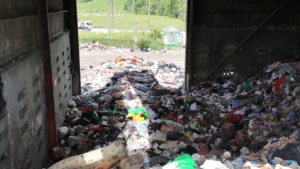 Marion Ali
Marion Ali
“This is your job. You work for yourself.”
Patricia Robateau
“Yes, self-employed.”
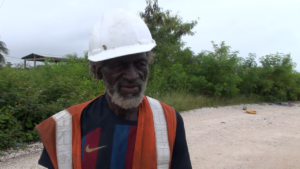
Robert McKoy
Robert McKoy, Trash Scavenger
“Everyday I fill my belly and I stay out of crime. I’m a gelly old all man. This place keep it just like I come from Brodies. The best things come to this place.
Marion Ali
“Okay, but you have to go through a lot of digging in garbage, so it’s not sanitary.”
Robert McKoy
“I’m the energizer, so digging doesn’t worry me. I come to dig and I come to sort, I come to seek and I will find.”
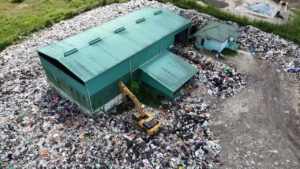 But the job is perhaps one of the most hazardous and unsanitary that exists because everything that is dumped from every sector of the community finds its way to the transfer station. Robateau says they have to gear down to face the filth.
But the job is perhaps one of the most hazardous and unsanitary that exists because everything that is dumped from every sector of the community finds its way to the transfer station. Robateau says they have to gear down to face the filth.
Patricia Robateau
“I just use this because there’s certain things in the dirt, it make you feel bad, and bacteria is in the dirt. So I wear my mask every time. Some of us wear masks. We wear gloves, then we wear a vest. This is not a company vest.”
Marion Ali
“What about your feet?”
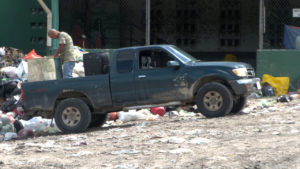 Patricia Robateau
Patricia Robateau
“And then we wear our boots, like one of those boots that the guys have on. And that is a complete dress with long pants and a T-shirt.”
The only upside to the job is the lucky find, that is, wallets containing money, jewellery, and other valuables that people discard by mistake. Once Mayor Trapp said he got a frantic call from a resident who needed to track down a valuable piece of jewellery.
Earl Trapp
“About six weeks ago. A young lady went to the garage. She was very concerned. She was crying, um, that the garbage truck picked up garbage from outside her house.”
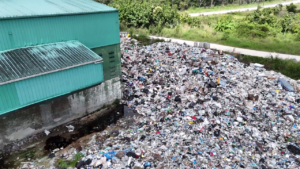 Marion Ali
Marion Ali
“She threw away what?”
Earl Trapp
“A piece of jewelry. I’m not sure if she found it, but I think the guy reached on time before the tractor was able to unload and I think she may have retrieved what she had thrown away.”
Robert McKoy
“People just throw away the wrong thing sometimes. Sometimes people throw away the wrong bag. And when they come to me, I have a clean heart. If they throw away the wrong bag and they cry to me, I don’t need no money. Hold the items.”
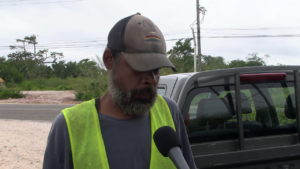
Sidney Forbes
Sidney Forbes, Trash Scavenger
“We find silver, gold, we find many things. We find even money. We come up, yoh call it come up.”
Marion Ali for News Five.







Facebook Comments